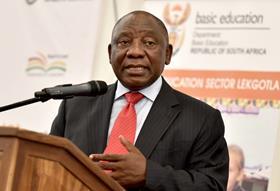
Thus far, the South African government has generally had a reasonably good response to the effectiveness of its Covid-19 measures. It has gone so well that the country had been placed at a level 3 lockdown, with parts of the economy opening up.
In recent weeks, however, the virus has spread from having its epicentre in the Western Cape to the highly populated Gauteng, including Johannesburg and Pretoria, Kwa-Zulu Natal and the Eastern Cape. In all these areas, medical facilities are now at breaking point.
Therefore, the sombre picture painted by president Ramaphosa on Sunday night (12 July) was to be expected. What South Africans did not like was the fact that the president banned liquor sales again – throwing them back to their experiences in April when a similar ban prevented the proverbial common practice of having a glass of wine at the end of the day.
Consumers argue that they are not in any way allowed to drink in pubs or restaurants – only in their own homes. It seems as if some South Africans did overdo things a bit, causing injury to themselves and others, and ending up in hospital where they take up beds that should be used for Covid-19 patients. The first lockdown was estimated to cost more than a million jobs in the liquor sector, while the country lost R1.3bn in tax revenue.
So, despite this and without warning, not even to industry leaders, the president announced his controversial decision. Most South Africans took a double gulp of their drinks and wondered just how long they will suffer this time.
Then they wondered why the government is so insistent when it comes to opening schools, while teachers and schools tell them they are not ready. Why the government did not respond to the state of medical facilities in the northern and eastern parts of the country which have been in decline for many years and why they would allow transport, mainly minibus taxis, to run at full capacity, further spreading the virus. After all, at home, consumers and citizens say, it is only them and their glass of wine. Increasingly, they do not understand the world of politics.
While the opposition-led Western Cape Province, once the epicentre of the virus which had to endure much criticism and pressure from the ANC-led government, has turned things around, it is alleged that the government has been fast asleep in the rest of the country.
The bulk of South Africa's deciduous fruit growing is located in the Western Cape and growers and their staff have had much to do with the turnaround in the pandemic in the rural regions of the Cape.
The apple and pear industry is now well into its season and by all accounts things are progressing reasonably well, albeit with great difficulty. Stefan Beukes, of Dennegeur Farms in Elgin, said that although exporters have had to adjust their programmes, shipments to the UK and Europe are higher than last year.
“This is boosted by higher demand in the UK, specifically also from the non-supermarket sector,' he said. 'It is amazing how quickly the service providers in this sector adapted to the Covid-19 situation.”
President Ramaphosa’s warning of dark days ahead was unwelcome news for the citrus sector in other parts of the country. “The past few weeks threw up some unexpected challenges,” said the Citrus Growers Association's Justin Chadwick. “The diesel shortage caught us by surprise and is hopefully in the process of being resolved. Then this week it was the wanton lawlessness of truck drivers as they resorted to criminal activities – and government’s inability to secure the safety of those who want to get on with their jobs.”
In terms of this lawlessness of truck drivers, Chadwick was refering to a national strike during which trucks were seized on key roads and set alight, all for the sake of protesting against foreign drivers being used on South African roads.
So far the citrus industry has exported around 44m cartons of an expected total crop of 140m cartons. Observers have pointed out that with the Valencia season only just having started, there is still a very long way to go to get to the end of the season.



